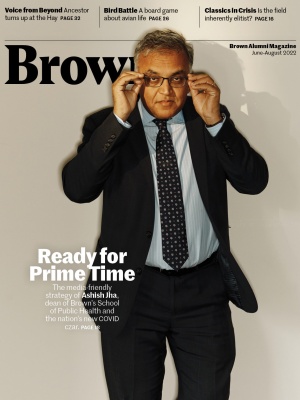The origin story for Intus Care, a startup that just won $3.1 million in growth capital, begins in Ann Arbor, Michigan. That’s where Robbie Felton ’21.5 grew up, accompanying his mom on her geriatric social worker rounds. And that’s where he moved back to in 2019 when he took a semester off, this time bringing two friends: Brown students Evan Jackson ’21.5 and Alex Rothberg ’22, who shared Felton’s vision of a better way to manage the reams of data modern healthcare generates about elderly patients with complex needs.
Again, they accompanied Felton’s mother—only this time, it was to her position as leader of a PACE program. The acronym stands for Program of All-inclusive Care for the Elderly, a country-wide, government-sponsored program to help vulnerable patients stay in their homes while receiving care during the day. The trio immersed themselves in the organization, interviewing both patients and caregivers to identify their needs. Then they’d return to Felton’s basement and dream up solutions.
The result is a company with 20 full-time employees that now manages partnerships with 18 care programs across eight different states, serving a total of 5,000 patients. Felton is CEO, Jackson is COO, and Rothberg is chief technology officer. Their clients have seen an average 17-percent reduction in hospitalization rates.
The Ann Arbor experience “led to a great sense of empathy,” says Jackson. “That’s the way we built our product—really feeling the challenges and the pain points of our clients.”
The primary problem they identified, Felton says, is that “some patients are slipping through the cracks,” leading to infections and hospitalizations. Healthcare providers may have plenty of data, he explains, but it’s seldom in user-friendly formats. So the team built a platform to integrate clinical, financial, and demographic data, then present insights on a customizable dashboard that updates in real time.
After returning to Rhode Island, they found their first client: PACE-RI. Before Intus Care, “we were knocking our heads against the wall” trying to figure out how to efficiently predict patient risk and identify patterns, says Betsy Canino, chief of clinical services. But now, the insights are “just right there at my fingertips. I can spend my time being a clinician, instead of being a statistician or data person.”
It’s a theme echoed by other clients. In complex geriatric care cases, providers are often “reacting to situations, instead of being able to proactively plan care or plan organizational strategies to best meet that population’s needs,” says Laura Ferrara, who served as CEO of a Michigan PACE program that partnered with Intus Care before joining the startup as chief strategy officer. “Intus Care was able to provide that for us.”
The platform won the 2020 Brown Venture Prize Competition and gained alumni advisors including Patty Riskind ’88, CEO of Orbita, a conversational AI company that automates workflow in healthcare. “What Intus Care is doing makes a big difference in helping facilities better manage their patients and helping patients to optimize their health and stay healthy,” she says.
Intus has now raised a total of $5 million in venture capital funding from investors including the Brown Angel Group and is building out its team as it sets its sights on expanding to more PACE programs and eventually to the broader Medicare and Medicaid population—roughly 155 million Americans. “We’ve built a really scalable platform,” Rothberg says. “Growing was always the plan.”






